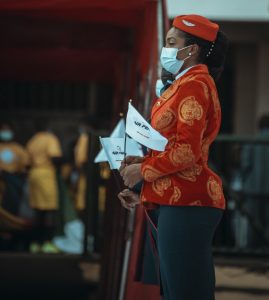In a celebration of cultural richness and inclusivity, international air hostesses are taking flight in traditional attire, marking a significant stride in the aviation industry towards embracing diversity. This initiative not only adds a vibrant splash of heritage to the skies but also fosters unity and appreciation for different cultures worldwide.
From the graceful folds of saris to the intricate designs of hanboks, air hostesses across the globe are integrating traditional clothing into their professional uniforms, infusing their inflight service with authenticity and cultural pride. By embracing attire that reflects their cultural backgrounds, these dedicated professionals exemplify the spirit of inclusiveness and respect for diverse heritages.
Recently, Air Peace, led by Allen Onyema, an Igbo entrepreneur renowned for his industrious spirit, made headlines with the launch of its pioneering London-Lagos route. The airline, challenging the dominance of foreign carriers in the market, not only asserts its indigenous identity but also showcases Nigerian and specifically Igbo culture to the world.
However, amidst the celebration, questions arose regarding the incorporation of Isi Agu, a traditional Igbo attire, into the airline’s uniform. Critics voiced concerns over ethnic identity and tribalism, but supporters argued that as a privately-owned business, Air Peace has the prerogative to represent its cultural roots. In a diverse nation like Nigeria, where businesses run by individuals from various ethnicities thrive, such expressions of cultural pride should be welcomed rather than criticized.
Air Peace’s commitment to showcasing Nigerian culture doesn’t stop at attire. Inflight entertainment and cuisine offer a taste of Nigeria, featuring delicacies from different ethnic groups, including the Hausa community. While some may question the focus on Igbo culture, supporters commend the airline for promoting diversity within a Nigerian context.
Social media buzzed with praise for Air Peace’s initiative. Users like @Ada_di_ora_mma expressed admiration for the airline’s promotion of Igbo culture, highlighting the significance of hearing pre-flight announcements in the Igbo language. Others, such as @OyediranAM, shared their pride in seeing the Isi Agu uniforms, emphasizing the elegance and cultural significance they represent.
Nevertheless, voices like @IkeGod_ raised concerns about lingering ethnic bigotry in Nigeria, echoing the sentiments of renowned author Chinua Achebe, who once noted the pervasive resentment towards the Igbo people in the nation. Despite such challenges, Air Peace’s embrace of cultural diversity serves as a beacon of hope, signaling a path towards greater unity and understanding.
This move by Air Peace is not unique; several airlines worldwide incorporate elements of traditional dress into their uniforms, reflecting their cultural heritage. From Singapore Airlines’ iconic sarong kebaya to Thai Airways’ Chut Thai dresses, these examples underscore a global trend towards celebrating diversity in the skies.
In essence, Air Peace’s embrace of traditional attire symbolizes more than just a fashion statement; it represents a commitment to inclusivity and unity in an increasingly interconnected world. As air hostesses proudly wear their heritage on their sleeves, they inspire passengers and colleagues alike to embrace cultural diversity and foster mutual respect across borders.
Anthony Emeka Nwosu
08038187914




